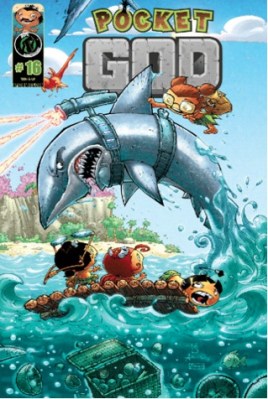Pocket God is best-known as a hit game for iOS and other smartphone platforms, but Dave Castelnuovo, head of developer Bolt Creative, says the story and characters have been embraced in another medium, too — namely, comic books.
Ape Entertainment started publishing the Pocket God comic series (both in print and on iOS) in August 2010, with a total of 16 issues so far, plus a digital-only series featuring bonus content. All told, the series has sold more than 600,000 digital copies, Castelnuovo says, with issue number one seeing more than 200,000 sales.
For an iOS game, those numbers wouldn’t be particularly impressive, but in the world of digital comics, they’re actually kind of amazing. For example, selling 200,000 copies puts Pocket God at roughly the same level as Avengers vs. X-men #1, which was the top-selling comic in March 2012. Castelnuovo says some subsequent issues have sold as many as 80,000 copies, which would place them among the top 10 comics for most months.
And here’s an important distinction: We’re talking about Pocket God’s digital sales, versus print sales for the other comics. Traditional comics publishers haven’t released much in the way of digital sales numbers, but they’re probably only a small percentage of print. In other words, judged purely on digital, Pocket God comics are probably outselling Marvel or DC’s top titles by a considerable margin. (The Pocket God Comics app has even reached #1 in paid books for the Apple App Store, and it’s currently ranked #19.)
One obvious conclusion: Releasing a comic book series based on a popular game in the same app store as the game itself, and promoting the comics in the game, will result in big sales. Castelnuovo doesn’t argue with that, but he also attributes the series’ continuing success to making the right creative choices — even though the comic is written by Jason M. Burns and drawn by Rolando Mallada, Castelnuovo (who is clearly a big comics fan) says he takes an active role in shaping the story lines, so that they’re suitably epic and capture Pocket God’s sadistic sense of humor. (I’ve only read issue number one, but within the first few pages, several characters are killed off gruesomely, then resurrected, for laughs.)
Another key difference: Pricing. The Pocket God app, which comes with issue #1, costs 99 cents, and you can pay 99 cents to download each subsequent issue. Meanwhile, the traditional publishers don’t want to undercut their print prices, so they’re usually charging $2.99 or $3.99 for new issues. (Some older comics are available for considerably less.) Castelnuovo says that’s “just too expensive” for digital comics, especially when they’re competing with something like Angry Birds, which offers more content for just 99 cents. And although Marvel and DC are sell digital collections, Castelnuovo argues that they should be doing more to bundle dozens or even hundreds of issues together, so that readers can “blaze through them” the way that they will consume entire seasons of Mad Men or Game of Thrones.
Revenue from the comics series is dwarfed by what Bolt is making from the Pocket God game, Castelnuovo says. Still, he’s clearly pleased that it exists, and that it’s selling well: “I’d love to continue it indefinitely.”
